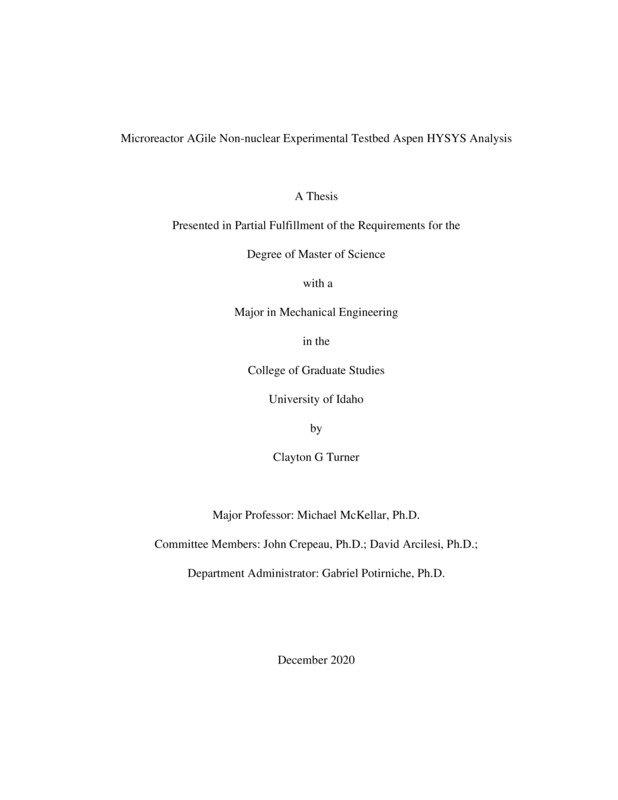Microreactor AGile Non-nuclear Experimental Testbed Aspen HYSYS Analysis
Turner, Clayton Glen. (2020-12). Microreactor AGile Non-nuclear Experimental Testbed Aspen HYSYS Analysis. Theses and Dissertations Collection, University of Idaho Library Digital Collections. https://www.lib.uidaho.edu/digital/etd/items/turner_idaho_0089n_11948.html
- Title:
- Microreactor AGile Non-nuclear Experimental Testbed Aspen HYSYS Analysis
- Author:
- Turner, Clayton Glen
- ORCID:
- 0000-0003-0460-0954
- Date:
- 2020-12
- Keywords:
- Aspen HYSYS Microreactor AGile Non-nuclear Experimental Testbed (MAGNET) Modular Nuclear Microreactor Power Conversion Unit Simulator Power Conversion Unit Start Up
- Program:
- Mechanical Engineering
- Subject Category:
- Mechanical engineering; Thermodynamics
- Abstract:
-
There is a lot of interest in modular nuclear microreactors and the benefits they bring for mobile power in remote areas and process heat applications (World Nuclear Association, 2020). Many companies in the nuclear power industry are developing various types of reactors, ranging from high temperature gas reactors (HTGRs), sodium-cooled fast reactors, molten salt reactors, light water reactors, and heat pipe cooled reactors. Each reactor type requires different thermal conditions to achieve their most efficient operations. Many of these miniaturized transportable reactor designs remain largely untested and unproven. To aid in the development of the miniaturized reactors, Idaho National Laboratory (INL) is developing a Microreactor AGile Non-nuclear Experimental Testbed (MAGNET). The MAGNET will be used to simulate the thermal conditions (pressures, temperatures, heat transfer fluids, etc.) that microreactors are expected to deliver. The MAGNET facility will accommodate various electrically heated microreactor prototypes. However, the first reactor type under consideration is a heat pipe cooled test article. The working fluid being considered to cool the heat pipes in the MAGNET system is nitrogen or helium with a max operating temperature of 600°C. To help in the development of the MAGNET facility, models were developed in Aspen HYSYS (Aspen Technology, Inc., 2016) to approximate the thermal conditions throughout the test loop.The MAGNET models created could be used to simulate the experiments and potential experiments for the MAGNET. This could save time and money by reducing the number of costly experiments that provide little information. It could also be used to simulate off design conditions to determine safety parameters that could be potentially dangerous, like extreme pressures or temperatures. From the analyses, it was shown that the upper end temperature while using helium could reach close to 635°C. This approaches the upper limit of the piping at 650°C, making helium potentially dangerous unless changes are made to the mass flow rate or heat pipe power load. The models also showed a detailed pressure drop throughout the system showing that the MAGNET’s compressor could handle the required pressure ratio. However, it also showed concern about the compressor handling the required mass flow rates. Another major application drawn from the HYSYS models was a representation of the heat loss and temperature loss throughout the piping. This showed that the heat loss from the piping was minimal when the power applied to the heat pipes was at least greater than 75 kW. Modular nuclear microreactors generate power using various power conversion units (PCUs). Several common PCUs include steam Rankine cycles, air Brayton cycles, closed helium Brayton cycles, recuperated Brayton cycles, supercritical carbon dioxide cycles, and organic Rankine cycles. Combined power cycles can also be used to increase the thermal efficiency of the PCU. Combined cycles could include a Brayton cycle with a steam Rankine bottoming cycle. An advantage of the MAGNET is having the ability to easily attach a PCU to the MAGNET. Two options were considered for adding a PCU to the MAGNET. The first option was to find a physical PCU unit to attach to the test loop and the second option was to develop a PCU simulator. The MAGNET HYSYS models were designed with a compressor and turbine to model a PCU. The configuration made was a recuperated Brayton cycle. The cycle was optimized by varying the outlet pressure of the turbine to achieve the highest thermal efficiency of 8.57% with nitrogen and 15.5% with helium. A PCU simulator was also designed from the research that Brayton cycles can be uniquely identified by three state points and knowing the pressure ratio. The PCU simulator simulates simple and recuperated Brayton cycles using a series of heat exchangers and valving. The major advantage of the PCU simulator was that it could simulate various Brayton cycles under various compressor and turbine efficiencies. However, the major disadvantage was that the system has be large capital cost estimated near 2.15 million dollars. A simple Brayton cycle start up process was analyzed to provide understanding for the start- up process of a nuclear powered Brayton cycle. The data provided an upper limit for realistic compressor and turbine adiabatic efficiencies of 85% and 90%, respectively. From the analysis, the three key state points were collected which would allow the PCU simulator to simulate start up processes. An understanding for how a nuclear powered Brayton cycle could start up was also learned from the analysis. One could say that the nuclear powered PCU start up is similar to a conventional natural gas PCU except when the start up process begins. The nuclear reactor would be at operating temperatures before the PCU started. Then the heat could be applied to the PCU instantly instead of at conventional timing in natural gas PCU. This thesis details the development of the Aspen HYSYS MAGNET model as well as the development of the PCU simulator, including cost estimates and start up analysis.
- Description:
- masters, M.S., Mechanical Engineering -- University of Idaho - College of Graduate Studies, 2020-12
- Major Professor:
- McKellar, Michael G
- Committee:
- Crepeau, John C; Arcilesi, David
- Defense Date:
- 2020-12
- Identifier:
- Turner_idaho_0089N_11948
- Type:
- Text
- Format Original:
- Format:
- application/pdf
- Rights:
- In Copyright - Educational Use Permitted. For more information, please contact University of Idaho Library Special Collections and Archives Department at libspec@uidaho.edu.
- Standardized Rights:
- http://rightsstatements.org/vocab/InC-EDU/1.0/

